Columns
- SLPP opens political office in Colombo; supporters say Namal or Dhammika will be the candidate for presidency, but Mahinda and Basil maintain silence
- Sampanthan’s death creates leadership tussle in TNA; Sumanthiran and Adaikalanathan among contenders
- NPP leader Anura Kumara Dissanayake will travel to Japan
By Our Political Editor
One area where it is reflected is both in the North and East. Prompting new developments is the aftermath of the death of Rajavarothiyam Sampanthan, the modern-day father figure in Tamil politics. The immediate result has been the fight for succession. A section wants to ensconce Abraham Sumanthiran, now spokesperson, as the leader of the Tamil National Alliance (TNA) parliamentary group. Another formidable faction, however, is in favour of Selvam Adaikalanathan. It comes at a time when the ITAK leadership election on January 21 in Trincomalee is being challenged in courts. Whoever climbs atop the TNA ladder will influence the grouping and internecine tussles cannot be ruled out. In this midst, a group is still busy canvassing opinions to put forward a common candidate. More on Sampanthan in the later paragraphs.
An important development in Colombo last Thursday was the opening of a new office of the Sri Lanka Podujana Peramuna (SLPP) at Rosmead Place, Colombo 7. The two key persons who played a prominent role were the party’s all-island organiser, Namal Rajapaksa, and millionaire businessman Dhammika Perera, Conspicuous by their absence were party leader Mahinda Rajapaksa and party founder Basil Rajapaksa. However, SLPP General Secretary Sagara Kariyawasam was present. He personally oversaw the boiling of a pot of milk at the new office and was the virtual master of ceremonies.
It was just last week that General Secretary Kariyawasam declared that Ranil Wickremesinghe should resign as leader of the United National Party (UNP) and seek membership in the SLPP. This is if he wants the party’s support as a presidential candidate. Kariyawasam is widely known to be a very close confidant of Basil Rajapaksa. SLPP sources disclosed yesterday that his comments came with the full knowledge of not only Basil Rajapaksa but also Mahinda Rajapaksa.
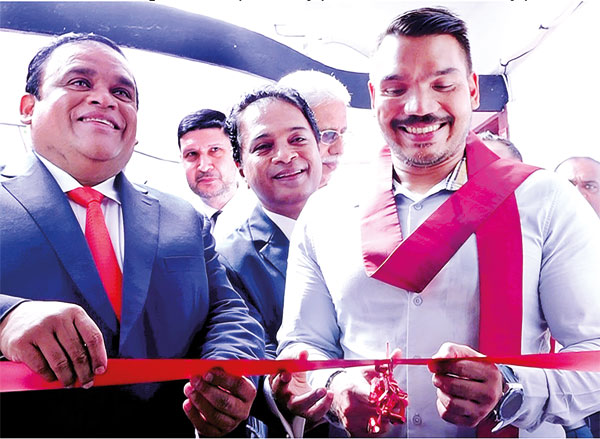
SLPP National Organiser Namal Rajapaksa and millionaire businessman Dhammika Perera cut a red ribbon to declare open their new office at Rosmead Place last Thursday. In the centre is SLPP General Secretary Sagara Kariyawasam.
The same sources said that the demand was a political tit-for-tat. It all began with a proposal by Nimal Lanza of the New Alliance and Duminda Dissanayake of a faction of the Sri Lanka Freedom Party (SLFP) that Ranil Wickremesinghe excludes the Rajapaksas and carry out his own election campaign. The proposal had been made at a meeting of a high-level media committee chaired by President Wickremesinghe. The move saw Basil Rajapaksa lodge a strong protest. Wickremesinghe later told him he had spoken to them and ensured that they would work as a team. The issue figured at the SLPP’s All Island Working Committee days ago where there was stern criticism over the development. It is here that participants took a string of decisions but chose to remain silent over them. Nevertheless, both Basil and Mahinda Rajapaksa found themselves in a delicate situation. They had agreed informally, much earlier to back Wickremesinghe but pressure was mounting on them now from their rank and file. This raises the all-important question—whether President Wickremesinghe has delayed the formal announcement of his candidature. He is yet to do so. Another sore point in SLPP circles is the public rally conducted jointly by the UNP and sections of the SLPP in Matara. The SLPP hierarchy feels that such an exercise should have been under their own umbrella and held after President Wickremesinghe’s candidature was announced.
One of those insisting that the SLPP field a candidate is Namal Rajapaksa MP. He has told party stalwarts that if defeated, they should sit in the opposition. These developments have caused divisions within the SLPP.
Interesting enough, it is from this new Rosmead Place office that Dhammika Perera announced in an SMS message on Thursday that he was ready to contest (the presidential election) if his party decides to field him. Backers of Namal Rajapaksa and Dhammika Perera speculate that they would be the SLPP candidates. This, however, cannot be verified independently. On the other hand, sources close to President Wickremesinghe are confident that his candidature will be backed by the SLPP. Such support will surely come from SLPP leader Mahinda Rajapaksa and founder Basil Rajapaksa, these sources said. However, the means of de-escalating the crisis that is now looming is more with President Wickremesinghe than with the Rajapaksas, who have an electorate to nurture and keep their rank and file together,
There are two sides to the current issue. If by an unforeseen circumstance, the SLPP chooses to field its own candidate, Ranil Wickremesinghe would have to contest as an independent candidate with the support of other political parties that choose to back him. On the other hand, if the new issues with the SLPP are resolved, it is becoming increasingly clear that he may be asked to keep to certain parameters. This is by agreeing to adhere to laid down party policies. The outcome is being keenly awaited. Either way, the result is bound to influence both the UNP as well as the SLPP. The UNP will have to be made stronger to face a general election. In the case of the SLPP, the internal strife in the party could grow with sections backing President Wickremesinghe.
For the New Alliance led by Nimal Lanza, SLPP Gampaha district and a section of the SLFP, an alliance of sorts appears to have linked the two. They are backing President Wickremesinghe. Their joint meeting in Wellawaya early this week saw a large turnout. Since the New Alliance is a new grouping, most crowds were those who backed the SLFP. Now, the party is in shambles and is facing litigation. This will prevent the SLFP from emerging as a single entity at the upcoming presidential poll or even the parliamentary election.
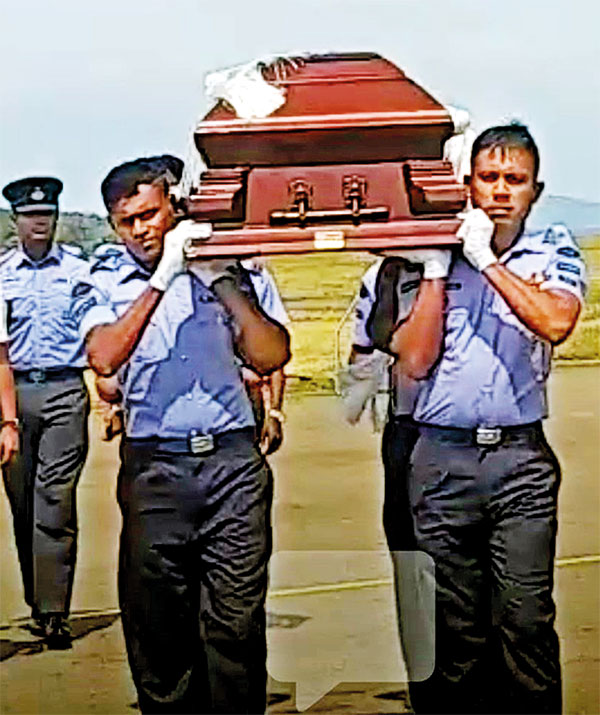
Sri Lanka Air Force personnel carry the coffin containing the body of Rajavarothayam Sampanthan, after it arrived at the Trincomalee Air Base.
Another is how 13 parliamentarians broke away from the SLPP to form the Freedom People’s Congress (FPC). One faction led by former minister, G.L. Peiris, and made up of six others, has already joined the Samagi Jana Balavegaya (SJB). They claim they are also members of the FPC. Now, the group’s leader, Dullas Allahapperuma, and General Secretary, Dr Charitha Herath, and four others are due to join. They are deliberating whether they should form an alliance or become members of the SJB.
The National People’s Power (NPP), whose major component is the Janatha Vimukthi Peramuna (JVP) is also now focusing on the minority vote. They have lined up meetings in the south, particularly in Muslim areas, to seek their support. Also due to travel to Japan, the last in his foreign travel itinerary, is their leader, Anura Kumara Dissanayake.
Now to the passing away of Rajavarothayam Sampanthan. His remains that lay in state in Parliament, were flown from Colombo to Palaly airport in Jaffna on July 4 in a Harbin Y 12 aircraft with just six seats. The rest had been removed to create space for the coffin. His body was lying at the Thanthai Chelvanayakam Memorial Centre in Jaffna for the people to pay respect. The next day, the same aircraft flew his remains to the Trincomalee air base from Palaly. Sampanthan was the oldest ever, serving Member of Parliament of Sri Lanka.
When he died, he was 91. In 2014, at 94, when he finally retired Rishang Keishing became the oldest serving MP of India. Charles Pelham Villiers was the longest continuously serving MP of the UK Parliament. He was elected in 1835 and remained an MP continuously for over 62 years until his death on January 16, 1898, aged 96 years 13 days.
As a 23-year-old young man, Sampanthan joined the Illankai Tamil Arasu Katchi (The Federal Party) in 1956. Although the then Party Leader S.J.V. Chelvanayakam offered candidacy in 1963 and 1970, Sampanthan declined and pursued his legal career in Trincomalee. As one of the most successful civil lawyers at that time, appearing in more than 600 cases at the Trincomalee bar, Sampanthan was finally persuaded by Appapillai Amirthalingam to contest the 1977 general elections. Sampanthan as a Tamil United Liberation Front (TULF) candidate won 15,144 votes to secure the Trincomalee electorate. The party won 18 seats to become the main opposition party for the first time in history.
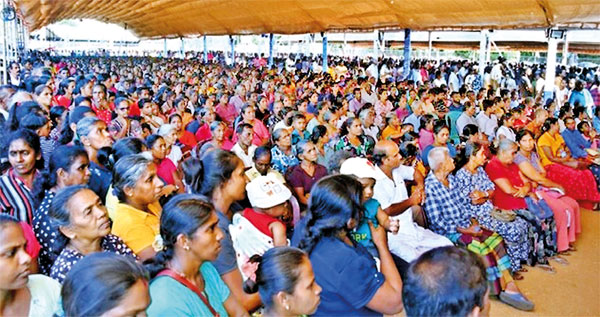
A section of the crowd at the rally organised by the New Alliance and one section of the SLFP in Wellawaya
Although he won that election on a mandate calling for a separate state to be established in the north and east of the country, many say, as an individual he never believed in separation. Some speculate that he intentionally avoided the well-known Tamil conference held in May 1976 at the northern town of Vaddukoddai where a resolution was passed calling for a separate state.
In 2001, a few Tamil intellectuals and nationalists persuaded various parties to form an alliance called the Tamil National Alliance (TNA). Sampanthan became the leader of that alliance. For the past 23 years, he has held that leadership position. Sampanthan, as TNA leader, has also held the post of the Leader of the Opposition in the 2015 Parliament until 2019.
Whether he has been a good leader or great leader, he certainly has earned the respect of all communities in Sri Lanka, other party leaders, Presidents and Prime Ministers alike. Former President Mahinda Rajapaksa was one of the first leaders to tweet his condolences. He tweeted, “My deepest condolences on the passing of TNA Leader R. Sampanthan. He was an old friend and colleague and we shared many a day discussing various issues. His commitment to a United Sri Lanka is exemplary”
President Ranil Wickramasinghe in addition to his official tweet, said, “Today, one of my colleagues who accompanied me to Parliament, MP Sampanthan, has passed away. I had the privilege of working closely with him during challenging times, and I deeply appreciate the contributions he made.”
Since independence, Tamil leadership has always been held by top class professional lawyers of that time. Most of them were well known orators both in Tamil and in English. Some of them spoke Sinhala too. From S J V Chelvanayagam, G G Ponnampalam, Appapillai Amirthalingam, Kumar Ponnampalam, S Sivasithamparam, Neelan Thiruchelvam, to R Sampanthan. With the death of Sampanthan, the battle for leadership will continue which in an election year and proposed general election and provincial council elections to follow soon thereafter, is likely to foster further disunity, in the north and east and become even more unpredictable.
In the years before his death, an ailing Sampanthan was compelled to lead a restricted life. He was frugal and lived in an upper floor of Summit Flats until he received an official bungalow. On the many occasions I met him, I had to sit in a drawing room suite whose arms were coming off. They had to be tied with coir rope. After his man Friday Gopal was moved to Trincomalee, those who took over did not do much good for him. Callers were put through intense questioning, and one wondered whether a message would reach him. That did not do good for Sampanthan.
Another matter of significance is the sittings of a five judge bench of the Supreme Court headed by Chief Justice Jayantha Jayasuriya. They will hear a petition filed by Chamindra Dayan Lenawa of Panadura seeking a ruling on when the presidential elections would be held. This is in the light of the Sinhala version of the Constitution saying that the President’s term is six years.
How the political parties fielding candidates for the presidential election will go through their paces to emerge as robust entities will be seen in the coming weeks.
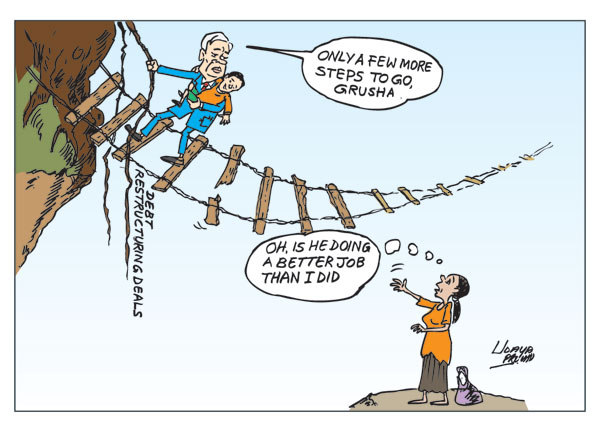
| Polls Chief says Commission going into election gear As weeks go by, Sri Lankans are increasingly focusing attention on the upcoming presidential election. Making that happen, “without fear or favour,”as he calls it, is R.M.A.L. Ratnayake, Chairman of the Election Commission. From a second-floor office in the Election Commission at Sarana Mawatha in Welikade, he is busy with a multitude of chores in what, at ten billion rupees, would easily be the costliest event in the country. In a Q and A with the Sunday Times, Ratnayake explained the Commission’s role which has a reach out of entire OFFICIAL ANNOUNCEMENT OF THE PRESIDENTIAL ELECTIONS: We are empowered constitutionally to announce the presidential election after July 17. The election should be held between September 17 and October 16. From the day we issue notice of a presidential election, nominations will have to be accepted within 16 to 21 days. We propose to issue such a notice either at the end of July or early August. In doing so, we must take into consideration whether the officials who will man the poll have sufficient time to complete the tasks assigned. The date of the election will be two weeks before the October 16 deadline. This is to allow time in the unlikely event of a repoll. 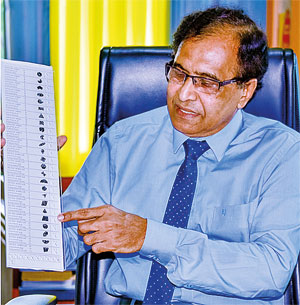 R.M.A.L. Ratnayake, Chairman of the Election Commission, shows a sample ballot paper like the one they would print for the upcoming presidential elections. The Treasury has already allocated ten billion rupees. If the amount exceeds, we will seek more funds. However, I believe this is enough since the work involved is relatively less. There will be one ballot paper for the entire country. In a local council election, it is different. There needs to be 341 separate ballot papers. That will cost more money. VOTER COUNT: The estimated registered number of voters at the upcoming presidential election will be 17 million. The figures are still being formulated. Polls will be on the 2024 electoral register. We are now expediting the registration of voters. This is routine. Every four months we add a supplementary list. Those who qualify are also able to place their names on the electoral register online. We will verify and confirm them. In the first quarter of this year, we included around 74,000 new voters in the 2024 register. Thus, those who completed 18 years in the first four months of this year, will have their names on the voters register. The preparation of electoral registers has been my main challenge. INVITING INTERNATIONAL OBSERVERS: We have planned to bring international election observers as we did during the 2019 presidential election. Already the European Union (EU) representatives held discussions with us. The Commonwealth Secretariat too has requested us to allow it to take part as election observers. The Asian Network for Free Elections also had made requests from us to carry out election monitoring. We plan to invite the usual election observers such as the Association of Asian Election Authorities (AAEA) and the Forum of the Election Management Bodies of South Asia (FEMBoSA)—a group of election monitoring countries. LOCAL ELECTION OBSERVERS: We have held two rounds of discussions with local election monitoring groups, but we have not taken a final decision. In any case, the local monitors will have specific areas. Some groups will be allowed to stay inside polling stations like during the past elections. Other election monitoring groups are not given that opportunity. They can have mobile patrols to monitor elections. We will not allow them into counting centres. Only the party agents would be allowed to enter counting centres. REGULATING SOCIAL MEDIA: We have a programme to regulate social media. Several institutes have asked to join us. We had a few rounds of discussions. We do not have the technical capabilities to directly monitor social media. We need external support. It is still at the discussion level. We plan to monitor social media such as Youtube, TikTok, and Facebook. We are also having discussions with the parent companies of the social media organisations to set up an action plan. As far as other media is concerned, the same rules that existed before will prevail. An election violence monitoring section (unit) would be set up at the Election Commission. The matters which happen within the country such as the distribution of goods, abuse of state property, etc will be monitored. The main unit would be set up at the Election Commission with a special group of officials. A Deputy Inspector General (DIG) along with a team of police officers would be kept there and obtain information on the situation. A similar plan would be set up in the 25 district election offices covering all districts. The mechanism will be operational after the election is announced. Until then we do not have the powers. However, we have not been silent on some issues. A recent attempt to appoint Local Government candidates of those who have handed in nominations for the local elections that have been suspended were to be appointed to Committees was stopped with our intervention. The Governors too have been informed not to appoint these members. LOGISTICS FOR THE POLLS: We have informed all district staff to carry out a survey about the staff requirements. There are various categories required for the conduct of the elections. They are also in the process of calling for applications from the relevant institutions. Currently, they are looking at the requirements of staff and vehicles. Last week we informed them to make preparations for the polling stations. Schools, religious places and even collection centres used to collect tea leaves are made use of. If necessary we will set up temporary sheds too. For differently-abled persons, we have special arrangements. In addition to providing easy access to them, this time for the visually handicapped persons there will be a special stencil which they could make use of. It is different to the brail system. We have done pilot projects and identified the system. This facility will be available in all booths. In any case, they also can bring someone with them. ALLOW VOTERS TO VOTE VIA POST: Yes it has been discussed. That is to provide an opportunity for advance voting. However, the relevant bill has not been approved by Parliament. Postal voting rights are provided for those involved in conducting the poll and security personnel. There are a number of people who cannot vote on that day. They include hospital staff, airport staff and media persons. There are a couple of options like allowing them to vote in advance or have special polling booths at their workplace such as National Hospital. The laws will have to be amended for this purpose. THE ISSUE OF DOUBLE CITIZENS: They cannot contest. They have all the other rights as other voters do.
| |
Buying or selling electronics has never been easier with the help of Hitad.lk! We, at Hitad.lk, hear your needs and endeavour to provide you with the perfect listings of electronics; because we have listings for nearly anything! Search for your favourite electronic items for sale on Hitad.lk today!


Some issues persist over SLPP’s support for Ranil
View(s):